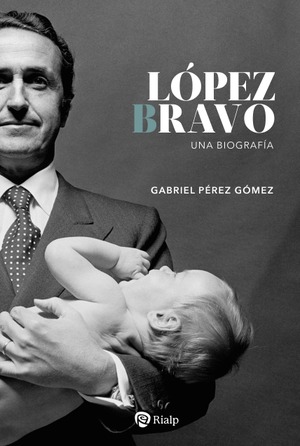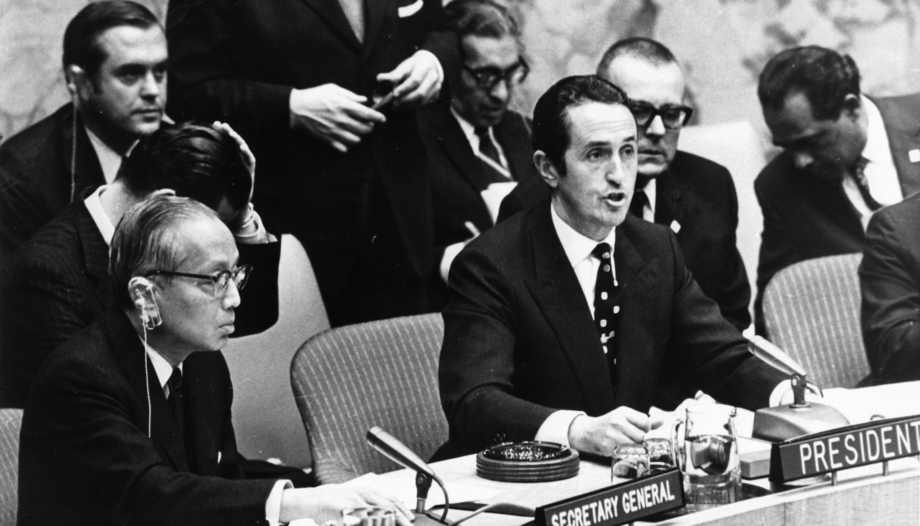If he had been born in another historical era, perhaps Gregorio López Bravo (1923-1985) would have been on the fringes of politics, or not so involved in his country's economy. But growing up and maturing in the mid and late twentieth century pushed him to do so. With a solid training as a naval engineer, he was Minister of Industry at the age of 39, in 1962; Minister of Foreign Affairs (1969-1973); and member of Congress in democracy (77-79).
"His decisive contributions to the modernization of the country, to its international projection and, in short, to its prestige, are indisputable", writes Alberto Horcajo, president of Impactunof which López Bravo was a promoter. In fact, in 1981, after leaving politics, he promoted the creation of the Institute of Education and Research for the support of the University of Navarra, which later became the current Impactun Foundation.
The author of the biography, Gabriel Pérez Gómez, has a doctorate in Information Sciences and is a journalist. He has been director of Televisión Española in Navarra and president of the Press Association of Pamplona, and during this time he has immersed himself in thousands of pages of various archives. He considers "of exceptional importance" the memorandum of López Bravo written in the plane that brought him back to Spain after the tense interview he had to have with Pope St. Paul VI in 1973.
Omnes has interviewed numerous members of charisms and institutions of the Church. It has also interviewed faithful of Opus Dei, or about them. For example, it has spoken with the Milanese Marta Risari or the young Lithuanian supernumerary mother Judita VelzieneAnd a few days ago, he published an interview about the Spanish banker and philanthropist Luis Vallswhose faith made him become a social banker. Now, in the thread of current affairs, talks with Gabriel Perez about Lopez Bravo on this biography that edits Rialp.
López Bravo. A biography

To begin with, a common question: What led you to investigate the life of Gregorio López Bravo?
-Well, it was a coincidence. I don't consider myself a biographer, especially when I read passionate and masterfully written biographies. A few years ago, having taken early retirement from TVE and with time on my hands, I embarked on the biography of my father-in-law, Álvaro d'Ors, because I owed him a debt of gratitude for the many things he had taught me. It seems that this book inspired someone from the Impactun Foundation and they proposed me to write this biography of López Bravo, coinciding with the centenary of his birth.
In this biography, you refer to matters of historical interest, because López Bravo, your biographer, played a precise role in them. The Stabilization Plan, the modernization of Spain, how did you approach it? Because the challenge was important.
- First of all, with great respect for the historical facts and then, trying to see the role that, personally, the protagonist played. I leave for the historians as many antecedents and consequences as the actions of my biographer had, from which very interesting monographs can emerge, but that would lead the reader to get lost in a tangle of data.
Because of López Bravo's status as a supernumerary of Opus Dei, he was integrated by the political clichés among the so-called "technocrats", the "Lópeces". But his book states that there were no more than three members of Opus Dei in two or three ministerial cabinets. Moreover, there were divergences among them, not counting opposing intellectuals such as Calvo Serer, also of Opus Dei.
- Of course. It seems to me that there was a very definite political interest in presenting the Work as an obscure organization that tried to take over all the levers of power. What I do is give the figures of the members of the Work who were at the head of some ministry and, at the same time, I echo the insistent preaching of St. Josemaría, in the sense that everyone acts in the professional, social or political sphere according to his own convictions, for which he is personally responsible, and that in no case do these actions represent Opus Dei or the Church. This explains what you point out about the fact that, within the Work itself, there were divergent political positions.
It combines information from numerous archives with documented reports on the plane crash in which he died, or on the tense interview of then Minister López Bravo with Pope St. Paul VI in 1973. Didn't López Bravo have problems of conscience? In fact, he was dismissed during the crisis of that year.
- I have read thousands of pages of the archives he cites. I knew what had been published about Lopez Bravo's interview with St. Paul VI and I had already practically written that chapter when, in one of the last days of consulting his personal archives (more than 120 boxes full of papers), when I thought that nothing of interest was going to appear, I came across a memorandum of Lopez Bravo written on the same plane that brought him back to Spain in which the content of that interview is recounted in synthesis.
It is a document of exceptional importance. As for the personal repercussions of that interview, I have not found anything written by López Bravo that tells how it influenced him, although I suppose he had to do some inner violence: he had to do his work as a minister, at the same time that he knew he was dealing with the Vicar of Christ.
He has a chapter dedicated to his human profile, his friendships... He talks about his austerity, his large family, his help to so many people, to the point of being almost in need after his years in politics, when the opposite is usually the case.
- Gregorio López Bravo gave himself to the exercise of friendship above many things. The testimonies of his friends are overwhelming. Even these days, with the biography just out, I am receiving letters and calls from people who knew him and who tell me details of their relationship with him. And he had friends of all kinds; it even seems to me that he was more friendly with those who thought differently.
The book also reflects the importance he gave to spiritual and doctrinal religious formation. For example, in the formation talks that he hosted in his house for years, whether there were three people or twelve, or his attitude on the day of the coup d'état of 23-F.
- He is a very clear case of a person who acts as he thinks, which leads him to share his spiritual concerns with his friends. Some of them even wondered if his presence in a retreat or in a meditation to which Gregory had invited him was due to his interest in getting closer to God or to the fact of corresponding to his friend's invitation.
"His greatest passion was always politics," his wife, Marián, told you. How did López Bravo handle his resignation from the government, supposedly because of a decision by Carrero Blanco? You say that you attended him before he died in a brutal attack. They had coincided at 9 o'clock Mass in the morning.
- I think he had to recycle himself. Politics and, therefore, public service, had occupied the central years of his life and, when he did not expect it, in full success, presiding over an OECD plenary session at the Château de la Muette, in Paris, he found out that Carrero Blanco did not count on him in the Government he had just formed. He lived from day to day, without a current account that assured him a certain stability, because he never took advantage of his positions to obtain "extra" income, as we see in so many cases in the past and in the present. His friends lent him a hand and he immediately emerged in the business world, to which he devoted his acumen until the fatal accident that took his life.








